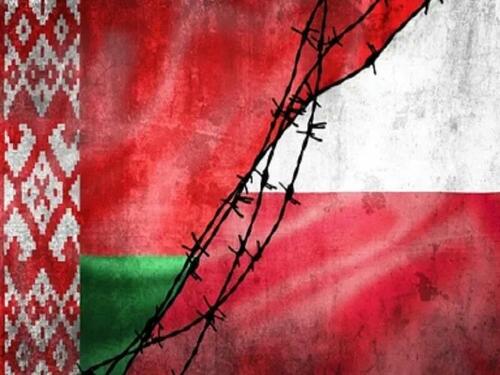
Authored by Andrew Korybko via substack,
Belarusian Foreign Minister Maksim Ryzhenkov revealed earlier this week that Poland rebuffed his country’s proposal to resolve their border problems, which followed President Aleksandr Lukashenko declaring earlier in the month that he won’t order the border service to protect the EU from migrants.
According to the Belarusian leader, it was the West that scrapped cooperation with his country, not the inverse.
Here are five relevant news items about these official statements for the reader’s interest:
* 2 July: “Lukashenko: I will not order the border service to protect the European Union from migrants”
* 15 July: “Belarus’ FM: Poland’s border measures are hectic, patternless”
* 15 July: “FM: Belarus invites Poland to study the situation on the border together”
* 15 July: “FM: Belarus is ready to discuss border situation, Poland has no interest in solving the issue”
* 16 July: “Belarus’ proposals to settle issues with Poland, Lithuania left unanswered”
It’s worthwhile pointing out that Belarus’ proposal called for Poland “to send to Belarus any Polish delegation, any Polish experts, specialists, representatives of the country’s authorities” to jointly investigate alleged migrant training camps and corrupt law enforcement officers.
Poland’s refusal led to Belarus suspecting that Warsaw actually intends to exploit the situation in order to build a new Iron Curtain.
This aligns with the insight that was shared over the past few months in these five analyses:
* 13 May: “Poland’s Border Fortification Buildup Has Nothing To Do With Legitimate Threat Perceptions”
* 2 June: “Poland Can Defend Itself From Invading Illegal Immigrants Without Worsening Tensions With Russia”
* 28 June: “The ‘EU Defense Line’ Is The Latest Euphemism For The New Iron Curtain”
* 5 July: “Germany Is Preparing To Assume Partial Responsibility For Poland’s Eastern Border Security”
* 11 July: “Belarusian Media Made A Good Point About Why Poland Shouldn’t Close The Border”
Belarus is at the very least turning a blind eye towards civilizationally dissimilar migrants illegally crossing the border with Poland as revenge for Warsaw’s support of summer 2020’s failed Color Revolution and continued hosting of anti-government militants. It might even be doing more than that according to Western media reports, however, which is why it’s odd that Poland declined to send any of its representatives to Belarus in order to investigate.
The Poles might have thought that they’d be taken on a “Potemkin tour” and that everything would be cleaned up before they got there since their itinerary would have to be agreed upon in advance, though there are also sensitive political dimensions to this that evade most observers’ attention. Any agreement to carry out joint work with Belarus in any capacity would lend legitimacy to its national authorities who Warsaw has considered to be “illegitimate” since summer 2020’s elections.
Seeing as how Poland has presented itself as NATO’s vanguard state against Russia (and its Union State partner of Belarus by extension), this would represent a noticeable break in Western unity driven by national interests, which could demoralize the West and also possibly risk a domino effect. Even if Poland went through with it and the consequences were manageable, no solution would likely be achieved until Warsaw recognizes Lukashenko’s re-election and stops hosting anti-government militants.
The Polish elite have no interest in complying with these implied demands even though they’re required to resolve the illegal immigrant crisis, hence why Belarus is right to suspect that it has ulterior motives in rebuffing the latest cooperation proposal in order to build a new Iron Curtain. Ultimately, Poland is sacrificing its national interests in pursuit of what its leadership considers to be the “greater good” of the US-led West as a whole, which reflects very poorly on its policymakers’ wisdom.
To be sure, these same policymakers believe that their national interests are indeed aligned with the US-led West’s in terms of retaining a united front against Russia and Belarus, but that’s arguably a misguided perception that’s responsible for subordinating Poland to Germany as explained here. The problem is that there isn’t any truly patriotic force with policymaking influence at the national level which prioritizes the pursuit of Polish interests over perceived collective ones even at the latter’s possible expense.
Until that changes, and there’s no telling when or even if that’ll even happen, the illegal immigrant crisis will continue since Belarus has no other means of asymmetrically responding to Poland’s failed Color Revolution attempt four years ago and continued hosting of anti-government militants. That’s not even to mention Poland’s unprecedented military buildup, which includes hosting more NATO forces than ever before, all of which has worsened their security dilemma and toxified ties between them.
Authored by Andrew Korybko via substack,
Belarusian Foreign Minister Maksim Ryzhenkov revealed earlier this week that Poland rebuffed his country’s proposal to resolve their border problems, which followed President Aleksandr Lukashenko declaring earlier in the month that he won’t order the border service to protect the EU from migrants.
According to the Belarusian leader, it was the West that scrapped cooperation with his country, not the inverse.
Here are five relevant news items about these official statements for the reader’s interest:
* 2 July: “Lukashenko: I will not order the border service to protect the European Union from migrants”
* 15 July: “Belarus’ FM: Poland’s border measures are hectic, patternless”
* 15 July: “FM: Belarus invites Poland to study the situation on the border together”
* 15 July: “FM: Belarus is ready to discuss border situation, Poland has no interest in solving the issue”
* 16 July: “Belarus’ proposals to settle issues with Poland, Lithuania left unanswered”
It’s worthwhile pointing out that Belarus’ proposal called for Poland “to send to Belarus any Polish delegation, any Polish experts, specialists, representatives of the country’s authorities” to jointly investigate alleged migrant training camps and corrupt law enforcement officers.
Poland’s refusal led to Belarus suspecting that Warsaw actually intends to exploit the situation in order to build a new Iron Curtain.
This aligns with the insight that was shared over the past few months in these five analyses:
* 13 May: “Poland’s Border Fortification Buildup Has Nothing To Do With Legitimate Threat Perceptions”
* 2 June: “Poland Can Defend Itself From Invading Illegal Immigrants Without Worsening Tensions With Russia”
* 28 June: “The ‘EU Defense Line’ Is The Latest Euphemism For The New Iron Curtain”
* 5 July: “Germany Is Preparing To Assume Partial Responsibility For Poland’s Eastern Border Security”
* 11 July: “Belarusian Media Made A Good Point About Why Poland Shouldn’t Close The Border”
Belarus is at the very least turning a blind eye towards civilizationally dissimilar migrants illegally crossing the border with Poland as revenge for Warsaw’s support of summer 2020’s failed Color Revolution and continued hosting of anti-government militants. It might even be doing more than that according to Western media reports, however, which is why it’s odd that Poland declined to send any of its representatives to Belarus in order to investigate.
The Poles might have thought that they’d be taken on a “Potemkin tour” and that everything would be cleaned up before they got there since their itinerary would have to be agreed upon in advance, though there are also sensitive political dimensions to this that evade most observers’ attention. Any agreement to carry out joint work with Belarus in any capacity would lend legitimacy to its national authorities who Warsaw has considered to be “illegitimate” since summer 2020’s elections.
Seeing as how Poland has presented itself as NATO’s vanguard state against Russia (and its Union State partner of Belarus by extension), this would represent a noticeable break in Western unity driven by national interests, which could demoralize the West and also possibly risk a domino effect. Even if Poland went through with it and the consequences were manageable, no solution would likely be achieved until Warsaw recognizes Lukashenko’s re-election and stops hosting anti-government militants.
The Polish elite have no interest in complying with these implied demands even though they’re required to resolve the illegal immigrant crisis, hence why Belarus is right to suspect that it has ulterior motives in rebuffing the latest cooperation proposal in order to build a new Iron Curtain. Ultimately, Poland is sacrificing its national interests in pursuit of what its leadership considers to be the “greater good” of the US-led West as a whole, which reflects very poorly on its policymakers’ wisdom.
To be sure, these same policymakers believe that their national interests are indeed aligned with the US-led West’s in terms of retaining a united front against Russia and Belarus, but that’s arguably a misguided perception that’s responsible for subordinating Poland to Germany as explained here. The problem is that there isn’t any truly patriotic force with policymaking influence at the national level which prioritizes the pursuit of Polish interests over perceived collective ones even at the latter’s possible expense.
Until that changes, and there’s no telling when or even if that’ll even happen, the illegal immigrant crisis will continue since Belarus has no other means of asymmetrically responding to Poland’s failed Color Revolution attempt four years ago and continued hosting of anti-government militants. That’s not even to mention Poland’s unprecedented military buildup, which includes hosting more NATO forces than ever before, all of which has worsened their security dilemma and toxified ties between them.
Loading…




